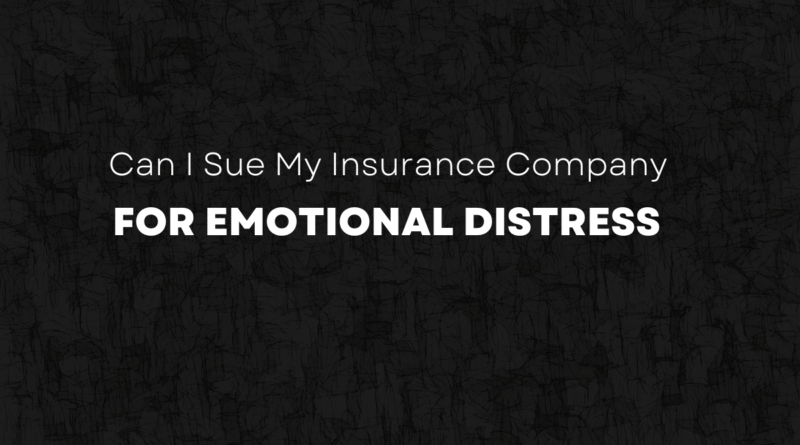Can I Sue My Insurance Company for Emotional Distress
Navigating the complex terrain of insurance claims can often be a source of frustration and emotional turmoil for many individuals. When facing denial, delay, or underpayment of claims, the question arises: “Can I sue my insurance company for emotional distress?” This article delves into the legal framework surrounding such actions, exploring the grounds, implications, and process of pursuing a lawsuit for emotional distress against an insurance company.
Understanding Emotional Distress Claims
What Constitutes Emotional Distress?
Emotional distress encompasses a wide range of psychological effects, including anxiety, depression, trauma, and other mental health issues resulting from a particular event or series of events. In the context of insurance, such distress often stems from the handling of a claim, be it through unfair denials, prolonged processes, or inadequate compensation.
Legal Grounds for a Claim
To sue an insurance company for emotional distress, one must establish that the company’s actions were wrongful or conducted in bad faith. Bad faith refers to the insurer’s failure to fulfill its obligations under the policy, without a reasonable basis for such actions. This could include unjust denial of coverage, unreasonable delays in processing claims, or failure to investigate a claim adequately.
The Legal Framework
Contractual vs. Tort Claims
When considering legal action, it’s essential to differentiate between contractual and tort claims. A contractual claim arises when one party fails to uphold their end of an agreement, in this case, the insurance policy. A tort claim, on the other hand, involves wrongful acts that cause harm, which can include emotional distress.
Bad Faith Insurance Practices
Bad faith insurance practices are central to most emotional distress claims against insurers. These practices might involve:
Denial of a claim without a valid reason:
Insurers must provide a justified reason for denying a claim. Baseless denials can be a form of bad faith.
Unnecessary delays:
Prolonging the claims process without a legitimate reason can cause significant emotional distress.
Failure to conduct a proper investigation:
Insurers are obligated to investigate claims thoroughly and fairly.
Case Law and Precedents
Notable Cases
Several landmark cases have set precedents for suing insurance companies for emotional distress. These cases often hinge on the insurer’s egregious conduct and the palpable emotional impact on the insured. Reviewing these can provide insight into the legal landscape and potential outcomes of such lawsuits.
State-Specific Laws and Regulations
It’s important to note that the legal framework governing insurance practices and emotional distress claims varies by state. Some states have more stringent regulations on insurance companies, making it easier to pursue bad faith claims, while others may have higher barriers to such lawsuits.
Pursuing a Lawsuit
When to Consider Legal Action
Deciding to take legal action is a significant step that should be considered carefully. If you’ve exhausted all avenues with your insurance company and believe their actions have caused you undue emotional distress, consulting with a legal professional can help determine the viability of your case.
The Role of Legal Counsel
An experienced attorney can provide invaluable guidance through the complexities of insurance law and emotional distress claims. They can assess the merits of your case, advise on the best course of action, and represent you throughout the legal process.
Gathering Evidence
A successful emotional distress claim requires substantial evidence. This might include documentation of the insurance claim process, communications with the insurer, medical records relating to the emotional distress, and expert testimony on the psychological impact of the insurer’s actions.
Potential Challenges and Considerations
Pursuing a lawsuit against an insurance company is not without its challenges. These can include the difficulty of proving emotional distress, the potential cost of legal proceedings, and the emotional toll of a lengthy legal battle. Understanding these factors is crucial in making an informed decision.
Read Also: How to Choose a Solar Installer for B2B Financing
Conclusion:
Suing an insurance company for emotional distress is a complex and challenging process that requires a thorough understanding of legal principles, a strong body of evidence, and skilled legal representation. While the emotional and financial toll of such legal action can be significant, holding insurers accountable for bad faith practices is crucial for justice and can pave the way for better industry standards. If you find yourself in a situation where your insurer’s actions have caused you significant emotional distress, seeking legal advice is a critical first step in determining your options and protecting your rights.
FAQs:
What qualifies as emotional distress in a lawsuit against an insurance company?
Emotional distress in the context of a lawsuit against an insurance company refers to significant mental suffering or anguish that stems directly from the company’s actions or inactions. This can include anxiety, depression, stress, or other psychological impacts resulting from the handling of your insurance claim, such as unjust claim denial, unreasonable delays, or failure to conduct a proper investigation.
How can I prove emotional distress in my case against the insurance company?
Proving emotional distress typically requires a combination of documentation and expert testimony. Key evidence might include:
- Detailed records of all communications with the insurance company, highlighting any instances of unfair treatment or bad faith practices.
- Medical records that document visits to healthcare professionals for issues related to stress, anxiety, or other psychological impacts caused by the insurance claim process.
- Testimony from mental health professionals who can attest to your condition and its likely connection to the insurance company’s actions.
Can I sue my insurance company for emotional distress without a lawyer?
While it’s legally possible to sue an insurance company on your own, it’s highly advisable to seek representation from a lawyer experienced in insurance law and emotional distress claims. These cases can be complex and challenging to navigate without in-depth legal knowledge and expertise, particularly when it comes to gathering evidence, understanding state-specific laws, and effectively arguing your case in court.
